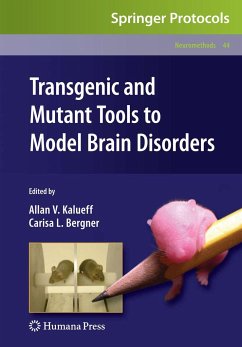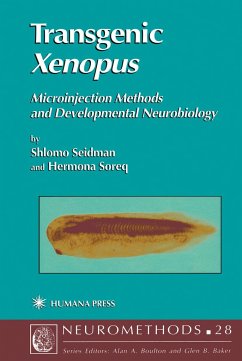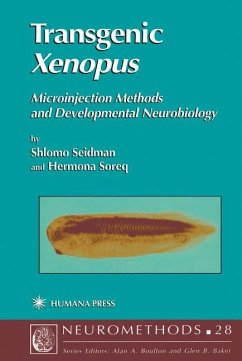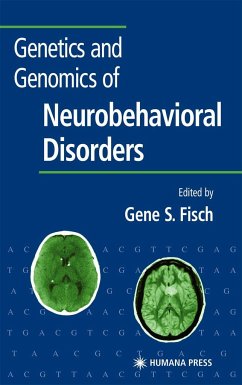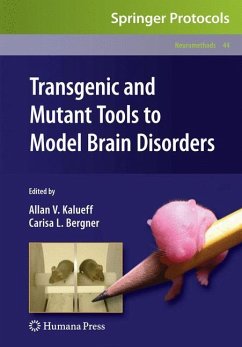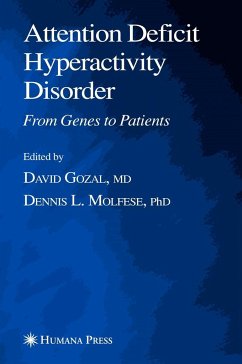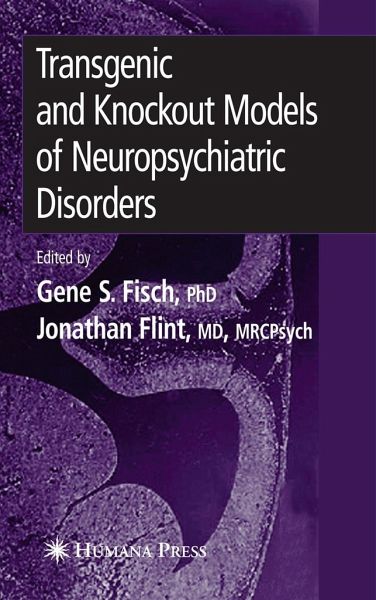
Transgenic and Knockout Models of Neuropsychiatric Disorders
Versandkostenfrei!
Versandfertig in 6-10 Tagen
151,99 €
inkl. MwSt.

PAYBACK Punkte
76 °P sammeln!
Neuroscientists are now establishing meaningful genotype-phenotype relationships for complex neurobehavioral and neuropsychiatric disorders and even creating animal models for these dysfunctions. These developments have made it imperative to know when such transgenic and knockout models are valid for the human disorders they represent. In Transgenic and Knockout Models of Neuropsychiatric Disorders, a panel of leading researchers comprehensively assesses how and whether the genetic abnormalities produced from these models manifest the neuropsychiatric disorders to which they correspond. The au...
Neuroscientists are now establishing meaningful genotype-phenotype relationships for complex neurobehavioral and neuropsychiatric disorders and even creating animal models for these dysfunctions. These developments have made it imperative to know when such transgenic and knockout models are valid for the human disorders they represent. In Transgenic and Knockout Models of Neuropsychiatric Disorders, a panel of leading researchers comprehensively assesses how and whether the genetic abnormalities produced from these models manifest the neuropsychiatric disorders to which they correspond. The authors focus on transgenic and knockout models of neurocognitive dysfunction and neuropsychiatric dysfunction. The discussion of neurobiological problems covers mental retardation, polyglutamate, as well as speech disorders, and disorders that involve cognitive, social, speech, and language dysfunction. The neuropsychiatric dysfunctions examined include psychosis and schizophrenia, anxiety, depression, and bipolar disorder. Timely introductory articles debate the alleged continuity of species of human and infrahuman behavior (Darwin), the utility of infrahuman animals in understanding human behavior and psychiatric disease, and the suitability of nonhuman models of complex neuropsychiatric dysfunctions involving language.
Comprehensive and systematic, Transgenic and Knockout Models of Neuropsychiatric Disorders offers a clear assessment of whether genetic abnormalities produced from infrahuman models manifest the neuropsychiatric disorders to which they correspond in humans and how best they may be used to carry out successful research today. In this up-to-date survey and critical assessment of transgenic and knockout models in neuropsychiatry and behavior, a panel of leading researchers comprehensively assesses how and whether the genetic abnormalities produced from these models manifest the neuropsychiatric disorders to which they correspond. The authors focus on transgenic and knockout models of neurocognitive dysfunction and neuropsychiatric dysfunction. The discussion of neurobiological problems covers mental retardation, polyglutamate, and speech disorders, as well as disorders that involve cognitive, social, speech, and language dysfunction. The neuropsychiatric dysfunctions examined include psychosis and schizophrenia, anxiety, depression, and bipolar disorder.
Comprehensive and systematic, Transgenic and Knockout Models of Neuropsychiatric Disorders offers a clear assessment of whether genetic abnormalities produced from infrahuman models manifest the neuropsychiatric disorders to which they correspond in humans and how best they may be used to carry out successful research today. In this up-to-date survey and critical assessment of transgenic and knockout models in neuropsychiatry and behavior, a panel of leading researchers comprehensively assesses how and whether the genetic abnormalities produced from these models manifest the neuropsychiatric disorders to which they correspond. The authors focus on transgenic and knockout models of neurocognitive dysfunction and neuropsychiatric dysfunction. The discussion of neurobiological problems covers mental retardation, polyglutamate, and speech disorders, as well as disorders that involve cognitive, social, speech, and language dysfunction. The neuropsychiatric dysfunctions examined include psychosis and schizophrenia, anxiety, depression, and bipolar disorder.



